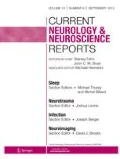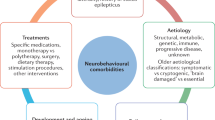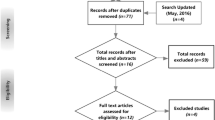Abstract
Purpose of Review
A paradigm shift in contemporary epileptology has been the reframing of both epilepsy and its comorbid memory disorders as the product of diseased brain networks. The current review discusses some of the clinical and theoretical implications that stem from this shift.
Recent Findings
Some implications of a network conceptualisation of epilepsy include a need for more widespread cognitive phenotyping in epilepsy; recognition that memory disorders in epilepsy can be multi-determined, including by non-structural factors; deeper consideration given to the neurodevelopmental context in which memory problems emerge; the utility of new methods to characterise memory impairments in epilepsy; and a call for greater recognition of the close interrelationships between memory comorbidities and psychiatric symptoms in epilepsy.
Summary
Memory disorder significantly worsens the quality of life of people with epilepsy, underscoring the importance to patient wellbeing of giving due consideration to the up-to-date neuropsychological practises outlined in this review.

Similar content being viewed by others
References
Papers of Particular Interest, Published Recently, Have Been Highlighted as: • of Importance •• of Major Importance
• Saling MM. Verbal memory in mesial temporal lobe epilepsy: beyond material specificity. Brain. 2009;132:570–82. The author constructs a sophisticated critical analysis of the memory literature in epilepsy to form a neuroanatomical model of human memory.
Scoville WB, Milner B. Loss of recent memory after bilateral hippocampal sclerosis. J Neurol Neurosurg Psychiatry. 1957;20:11–21.
Gadian DG, Aicardi J, Watkins KE, Porter DA, Mishkinm V-KF. Developmental amnesia associated with early hypoxic–ischaemic injury. Brain. 2000;123:499–507.
•• Scheffer IE, Berkovic S, Capovilla G, Connolly MB, French J, Guilhoto L, et al. ILAE classification of the epilepsies: position paper of the ILAE Commission for Classification and Terminology. Epilepsia. 2017;28:512–21. This paper sets out the new classification system for epilepsy, in which epilepsy is reframed as a network disease of which neuropsychological comorbidities are a central feature.
Berkovic SF, Jackson GD. ‘Idiopathic’ no more! Abnormal interaction of large-scale brain networks in generalized epilepsy. Brain. 2014;137:2400–2.
Perrine K, Hermann BP, Meador KJ, Vickrey BG, Cramer JA, Hays RD, et al. The relationship of neuropsychological functioning to quality of life in epilepsy. Arch Neurol. 1995;52:997–1003.
Giovagnoli AR, Parente A, Tarallo A, Casazza M, Franceschetti S, Avanzini G. Self-rated and assessed cognitive functions in epilepsy: impact on quality of life. Epilepsy Res. 2014;108:1461–8.
Heilman KM. Aphasia and the diagram makers revisited: an update of information processing models. Journal of Clinical Neurology. 2006;2:149–62.
Yeo BT, Krienen FM, Sepulcre J, Sabuncu MR, Lashkari D, Hollinshead M, et al. The organization of the human cerebral cortex estimated by intrinsic functional connectivity. J Neurophys. 2011;106:1125–65.
• Park HJ, Friston K. Structural and functional brain networks: from connections to cognition. Science. 2013;342:1238411. An accessible discussion on how cognition can be thought of as the product of brain networks.
Sporns O. The human connectome: a complex network. Ann N Y Acad Sci. 2011;1224:109–25.
Vaughan DN, Rayner G, Tailby C, Jackson GD. MRI-negative temporal lobe epilepsy: a network disorder of neocortical connectivity. Neurology. 2016;87:1934–42.
Stretton J, Thompson PJ. Frontal lobe function in temporal lobe epilepsy. Epilepsy Res. 2012;98:1–3.
Tailby C, Jackson GD. Cognitive impairment in epilepsy as disruption of task-dependent network reconfiguration. Abstract accepted as a poster by the Organisation for Human Brain Mapping Annual Meeting. 2016;
Pedersen M, Omidvarnia AH, Walz JM, Jackson GD. Increased segregation of brain networks in focal epilepsy: an fMRI graph theory finding. NeuroImage Clin. 2015;8:536–42.
•• Stam CM. Epilepsy: What can we learn from modern network theories? Epileptologie. 2016;33:38–43. The author presents a clear discussion of some of the issues stemming from the move towards a network approach to epilepsy, and the implications of this for cognition and behaviour.
Terry JR, Benjamin O, Richardson MP. Seizure generation: the role of nodes and networks. Epilepsia. 2012;53:e166–9.
Tailby C, Rayner G, Wilson S, Jackson G. The spatiotemporal substrates of autobiographical recollection: using event-related ICA to study cognitive networks in action. NeuroImage. 2017;152:237–48.
Baldo JV, Shimamura AP. Frontal lobes and memory. In: Baddeley AD, Kopelman MD, Wilson BA, editors. The handbook of memory disorders. Chichester: John Wiley & Sons, Ltd; 2002. p. 363–79.
Budson AE, Price BH. Memory dysfunction. N Engl J Med. 2005;352:692–9.
O’Muircheartaigh J, Richardson MP. Epilepsy and the frontal lobes. Cortex. 2012;48:144–55.
Rayner G, Jackson GD, Wilson SJ. Behavioral profiles in frontal lobe epilepsy: autobiographic memory versus mood impairment. Epilepsia. 2015;56:225–33.
Drane DL, Lee GP, Cech H, Huthwaite JS, Ojemann GA, Ojemann JG, et al. Structured cueing on a semantic fluency task differentiates patients with temporal versus frontal lobe seizure onset. Epilepsy Behav. 2006;9:339–44.
McKinnon MC, Nica EI, Sengdy P, Kovacevic N, Moscovitch M, Freedman M, et al. Autobiographical memory and patterns of brain atrophy in fronto-temporal lobar degeneration. J Cogn Neurosci. 2008;20:1839–53.
Thaiss L, Petrides M. Autobiographical memory of the recent past following frontal cortex or temporal lobe excisions. Eur J Neurosci. 2008;28:829–40.
Baxendale S, Thompson P. The new approach to epilepsy classification: cognition and behavior in adult epilepsy syndromes. Epilepsy Behav. 2016;64:318–21.
• Rayner G, Jackson GD, Wilson SJ. Mechanisms of memory impairment in epilepsy depend on age at disease onset. Neurology. 2016;87:1642–9. This study examines predictors of autobiographic memory dysfunction for patients grouped by the timing of disease onset, combining the phenotyping and neurodevelopment approaches advocated in this review.
Insel T, Cuthbert B, Garvey M, Heinssen R, Pine DS, Quinn K, et al. Research domain criteria (RDoC): toward a new classification framework for research on mental disorders. Am J Psychiatry. 2010;167:748–51.
Robinson PN. Deep phenotyping for precision medicine. Hum Mutat. 2012;33:777–80.
Berg AT, Berkovic SF, Brodie MJ, Buchhalter J, Cross JH, van Emde BW, et al. Revised terminology and concepts for organization of seizures and epilepsies: report of the ILAE commission on classification and terminology, 2005-2009. Epilepsia. 2010;51:676–85.
•• Hermann B, Seidenberg M, Lee EJ, Chan F, Rutecki P. Cognitive phenotypes in temporal lobe epilepsy. J Int Neuropsychol Soc. 2007;13:12–20. This study was the first to describe cognitive phenotypes of epilepsy, setting the benchmark for this important research technique.
Hamilton JP, Chen G, Thomason ME, Schwartz ME, Gotlib IH. Investigating neural primacy in major depressive disorder: multivariate granger causality analysis of resting-state fMRI time-series data. Mol Psychiatry. 2011;16:763–72.
Olafsson E, Ludvigsson P, Hesdorffer D, Kjartansson O, Hauser WA, Gudmundsson G. Incidence of unprovoked seizures and epilepsy in Iceland and assessment of the epilepsy syndrome classification: a prospective study. Lancet Neurol. 2005;4:627–34.
Anderson V, Spencer-Smith M, Wood A. Do children really recover better? Neurobehavioural plasticity after early brain insult. Brain. 2011;134:2197–21.
Menlove L, Reilly C. Memory in children with epilepsy: a systematic review. Seizure. 2015;25:126–35.
Wood AG, Saling MM, O'Shea MF, Jackson GD, Berkovic SF. Reorganization of verbal memory and language: a case of dissociation. J Int Neuropsychol Soc. 1999;5:69–74.
Wheeler MA, Stuss DT, Tulving E. Toward a theory of episodic memory: the frontal lobes and autonoetic consciousness. Psychol Bull. 1997;121:331–54.
Buchanan TW, Tranel D, Adolphs R. Memories for emotional autobiographical events following unilateral damage to medial temporal lobe. Brain. 2006;129:115–27.
Noulhiane M, Piolino P, Hasboun D, Clemenceau S, Baulac M, Samson S. Autobiographical memory after temporal lobe resection: neuropsychological and MRI volumetric findings. Brain. 2007;130:3184–99.
Herfurth K, Kasper B, Schwarz M, Stefan H, Pauli E. Autobiographical memory in temporal lobe epilepsy: role of hippocampal and temporal lateral structures. Epilepsy Behav. 2010;19:365–71.
St Laurent M, Moscovitch M, Levine B, McAndrews MP. Determinants of autobiographical memory in patients with unilateral temporal lobe epilepsy or excisions. Neuropsychologia. 2009;47:2211–21.
Addis DR, Moscovitch M, McAndrews MP. Consequences of hippocampal damage across the autobiographical memory network in left temporal lobe epilepsy. Brain. 2007;130:2327–42.
Allebone J, Rayner G, Siveges B, Wilson SJ. Altered self-identity and autobiographical memory in epilepsy. Epilepsia. 2015;56:1982–91.
Voltzenlogel V, Despres O, Vignal J-P, Kehrli P, Manning L. One-year postoperative autobiographical memory following unilateral temporal lobectomy for control of intractable epilepsy. Epilepsia. 2007;48:605–8.
Laufs H, Hamandi K, Salek-Haddadi A, Kleinschmidt AK, Duncan JS, Lemieux L. Temporal lobe interictal epileptic discharges affect cerebral activity in ‘default mode’ brain regions. Hum Brain Mapp. 2007;28:1023–32.
Frings L, Schulze-Bonhage A, Spreer J, Wagner K. Remote effects of hippocampal damage on default network connectivity in the human brain. J Neurol. 2009;256:2021–9.
Liao W, Zhang Z, Pan Z, Mantini D, Ding J, Duan X, et al. Altered functional connectivity and small-world in mesial temporal lobe epilepsy. PLoS One. 2010;5:e8525.
Liao W, Zhang Z, Pan Z, Mantini D, Ding J, Duan X, et al. Default mode network abnormalities in mesial temporal lobe epilepsy: a study combining fMRI and DTI. Hum Brain Mapp. 2011;32:883–95.
Pittau F, Grova C, Moeller F, Dubeau F, Gotman J. Patterns of altered functional connectivity in mesial temporal lobe epilepsy. Epilepsia. 2012;53:1013–23.
Voets NL, Beckmann CF, Cole DM, et al. Structural substrates for resting network disruption in temporal lobe epilepsy. Brain. 2012;13:2350–7.
Centeno M, Perani K, St Pier K, et al. Default mode network dysfunction in a patient with epilepsy in the precuneus. Washington: American Epilepsy Society Annual Meeting; 2013.
Blumenfeld H, McNally KA, Vanderhill SD, Paige AL, Chung R, Davis K, et al. Positive and negative network correlations in temporal lobe epilepsy. Cereb Cortex. 2004;14:892–902.
Danielson NB, Guo JN, Blumenfeld H. The default mode network and altered consciousness in epilepsy. Behav Neurol. 2011;24:55–65.
Cataldi M, Avoli M, de Villers-Sidani E. Resting state networks in temporal lobe epilepsy. Epilepsia. 2013;54:2048–59.
Young KD, Siegle GJ, Zotev V, Phillips R, Misaki M, Yuan H, Drevets WC, Bodurka J. Randomized clinical trial of real-time fMRI amygdala neurofeedback for major depressive disorder: effects on symptoms and autobiographical memory recall. Am J Psychiatry 2017;4: doi: 10.1176/appi.ajp.2017.16060637.
Djordjevic J, Jones-Gotman M. Inquiry on assessments across epilepsy centers in different countries. In: Helmstaedter C, Hermann B, Lassonde M, Kahane P, editors. Neuropsychology in the Care of People with Epilepsy. Montrouge: John Libbey Eurotext; 2011. p. 13–26.
Wilson SJ, Saling MM. Contributions of the right and left mesial temporal lobes to music memory: evidence from melodic learning difficulties. Music Percept. 2008;25:12.
Samson S, Dellacherie D, Platel H. Emotional power of music in patients with memory disorders. Ann N Y Acad Sci. 2009;1169:245–55.
Gosselin N, Peretz I, Noulhiane M, Hasboun D, Beckett C, Baulac M, et al. Impaired recognition of scary music following unilateral temporal lobe excision. Brain. 2005;128:628–40.
Duvarci S, Pare D. Amygdala microcircuits controlling learned fear. Neuron. 2014;82:966–80.
Tulving E. Episodic memory: from mind to brain. Annu Rev Psychol. 2002;53:1–25.
Hassabis D, Maguire EA. Deconstructing episodic memory with construction. Trends Cogn Sci. 2007;11:299–306.
Schacter DL, Addis DR, Buckner RL. Remembering the past to imagine the future: the prospective brain. Nat Rev Neurosci. 2007;8:657–61.
Lechowicz M, Miller L, Irish M, Addis DR, Mohamed A, Lah S. Imagining future events in patients with unilateral temporal lobe epilepsy. Br J Clin Psychol. 2016;55:187–205.
Fuller-Thomson E, Brennenstuhl S. The association between depression and epilepsy in a nationally representative sample. Epilepsia. 2009;50:1051–8.
Adams SJ, O'Brien TJ, Lloyd J, Kilpatrick CJ, Salzberg MR, Velakoulis D. Neuropsychiatric morbidity in focal epilepsy. Br J Psychiatry. 2008;192:464–9.
Rayner G, Jackson GD, Wilson SJ. Two distinct symptom-based phenotypes of depression in epilepsy yield specific clinical and etiological insights. Epilepsy Behav. 2016;64:336–44.
Australian Bureau of Statistics (ABS). National survey of mental health and wellbeing: summary of results, Australia, 2007. ABS cat. no. 4326.0. Canberra: ABS; 2008.
Rayner G, Jackson GD, Wilson SJ. Cognition-related brain networks underpin the symptomotology of unipolar depression: evidence from a systematic review. Neurosci Biobehav Rev. 2016;61:53–65.
Rayner G. The contribution of cognitive networks to depression in epilepsy. Epilepsy Curr. 2017;2:78–83.
Brown FC, Westerveld M, Langfitt JT, Hamberger M, Hamid H, Shinnar S, et al. Influence of anxiety on memory performance in temporal lobe epilepsy. Epilepsy Behav. 2014;31:19–24.
Paradiso S, Hermann BP, Blumer DP, Davies K, Robinson RG. Impact of depressed mood on neuropsychological status in temporal lobe epilepsy. J Neurol Neurosurg Psychiatry. 2001;70:180–5.
Helmstaedter C, Sonntag-Dillender M, Hoppe C, Elger C. Depressed mood and memory impairment in temporal lobe epilepsy as a function lateralization and localization. Epilepsy Behav. 2004;5:696–701.
Dulay MF, Schefft BK, Fargo JD, Privitera MD, Yeh H. Severity of depressive symptoms, hippocampal sclerosis, auditory memory, and side of seizure focus in temporal lobe epilepsy. Epilepsy Behav. 2004;5:522–31.
Brown FC, Westerveld M, Langfitt JT, Hamberger M, Hamid H, Shinnar S, et al. Influence of anxiety on memory performance in temporal lobe epilepsy. Epilepsy Behav. 2014;31:19–24.
Gandy M, Sharpe L, Perry KN. Cognitive behavior therapy for depression in people with epilepsy: a systematic review. Epilepsia. 2013;54:1725–34.
• Kanner AM. Most antidepressant drugs are safe for patients with epilepsy at therapeutic doses: a review of the evidence. Epilepsy Behav. 2016;61:282–6. A review to reassure physicians as to the safety in prescribing antidepressant drugs for people with epilepsy.
DeBattista C, Lembke A, Solvason HB, Ghebremichael R, Poirier J. A prospective trial of modafinil as an adjunctive treatment of major depression. J Clin Psychopharmacol. 2004;24:87–90.
McIntyre RS, Lophaven S, Olsen CK. A randomized, double-blind, placebo-controlled study of vortioxetine on cognitive function in depressed adults. Int J Neuropsychopharmacol. 2014;17:1557–67.
Rayner G, Wrench JM, Wilson SJ. Differential contributions of objective memory and mood to subjective memory complaints in refractory focal epilepsy. Epilepsy Behav. 2010;19:359–64.
Fisher RS, Vickrey BG, Gibson P, Hermann B, Penovich P, Scherer A, et al. The impact of epilepsy from the patient’s perspective I. Descriptions and subjective perceptions. Epilepsy Res. 2000;41:39–51.
Giovagnoli AR, Avanzini G. Quality of life and memory performance in patients with temporal lobe epilepsy. Acta Neurol Scand. 2000;101:295–300.
Marques CM, Caboclo LOSF, da Silva TI, da Silva Noffs MH, Carrete H Jr, Lin K, et al. Cognitive decline in temporal lobe epilepsy due to unilateral hippocampal sclerosis. Epilepsy Behav. 2007;10:477–85.
Au A, Leung P, Kwok A, Li P, Lui C, Chan J. Subjective memory and mood of Hong Kong Chinese adults with epilepsy. Epilepsy Behav. 2006;9:68–72.
Baños JH, LaGory J, Sawrie S, Faught E, Knowlton R, Prasad A, et al. Self-report of cognitive abilities in temporal lobe epilepsy: cognitive, psychosocial, and emotional factors. Epilepsy Behav. 2004;5:575–9.
Piazzini A, Canevini MP, Maggiori G, Canger R. The perception of memory failures in patients with epilepsy. Eur J Neurol. 2001;8:613–20.
Grewe P, Nikstat A, Koch O, Koch-Stoecker S, Bien CG. Subjective memory complaints in patients with epilepsy: the role of depression, psychological distress, and attentional functions. Epilepsy Res. 2016;127:78–86.
Hendriks MPH, Aldenkamp AP, van der Vlugt H, Alpherts WC, Vermeulen J. Memory complaints in medically refractory epilepsy: relationship to epilepsy-related factors. Epilepsy Behav. 2002;3:165–72.
Witt J-A, Glöckner C, Helmstaedter C. Extended retention intervals can help to bridge the gap between subjective and objective memory impairment. Seizure. 2012;21:134–40.
Beck AT. The evolution of the cognitive model of depression and its neurobiological correlates. Am J Psychiatr. 2008;165:969–77.
Acknowledgements
We would like to thank Professor Graeme Jackson for his support, as well as our colleagues in the Comprehensive Epilepsy Programme at Austin Health. We would also like to acknowledge the support from a National Health and Medical Research Council project grant #APP1081151.
Author information
Authors and Affiliations
Corresponding author
Ethics declarations
Conflict of Interest
Genevieve Rayner and Chris Tailby each declare no potential conflicts of interest.
Human and Animal Rights and Informed Consent
This article does not contain any studies with human or animal subjects performed by any of the authors.
Additional information
This article is part of the Topical Collection on Behaviour
Rights and permissions
About this article
Cite this article
Rayner, G., Tailby, C. Current Concepts of Memory Disorder in Epilepsy: Edging Towards a Network Account. Curr Neurol Neurosci Rep 17, 55 (2017). https://doi.org/10.1007/s11910-017-0765-7
Published:
DOI: https://doi.org/10.1007/s11910-017-0765-7




